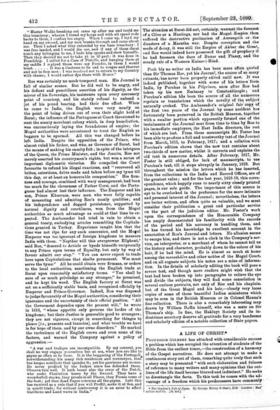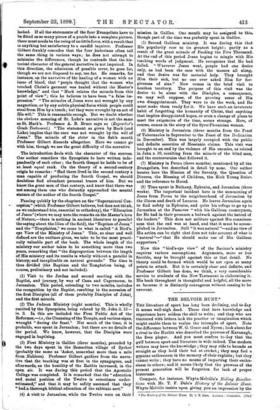A LIFE OF CHRIST.* PROFESSOR GILBERT has attacked with considerable
success a problem which has occupied the attention of students of the Bible from the earliest times,—the construction of a harmony of the Gospel narratives. He does not attempt to make a continuous story out of them, remarking quite truly that such a story may be presented " with such elaboration and fulness of reference to many writers and many opinions that the out- lines of the life itself become blurred and indistinct." He seeks to disentangle the facts. To this task he comes with the ad- vantage of a freedom which his predecessors have commonly
• The Student's Life of loom. By George Holley G nett, D.D. ' London : Mac nitnan and Co. [5e. net.]
lacked. If all the statements of the four Evangelists have to be fitted as so many pieces of a puzzle into a complete picture, there must needs be the using of no little force, with a result that is anything but satisfactory to a candid inquirer. Professor Gilbert frankly concedes that the four historians often tell the same thing -in various ways ; he does not attempt to minimise the differences, though he contends that the his- torical character of the general narrative is not impaired. In this direction, the admission of possible error, he goes far, though we are not disposed to say, too far. He remarks, for instance, on the narrative of the healing of a woman with an issue of blood, that "people thought that the woman who touched Christ's garment was healed without the Master's knowledge," and that " Mark relates the miracle from this point of view "; this he believes to have been "a false im- pression." " The miracles of_Jesas were not wrought by any magnetism, or by any subtle physioalforce which people could steal from Him by a touch ; but they were wrought by an act of His will." This is reasonable enough. But we doubt whether the obvious meaning of St. Luke's narrative is not the same as St. Mark's. Professor A. B. Bruce says so (Expositor's Greek Testament.) " The statement as given by Mark (and Luke) implies that the cure was not wrought by the will of Jesus." The miracle of the staler in the fish's mouth Professor Gilbert discards altogether. Here we cannot go with him, though we see the great difficulty of the narrative.
The introduction deals with the character of the sources. Oar author considers the Synoptists to have written inde- pendently of each other ; the fourth Gospel be holds to be of at.. least equal rank. On the theory of a second-century origin he remarks : " Had there lived in the second century a man capable of producing the fourth Gospel, we should doubtless find abundant personal traces of him. But we know the great men of that century, and know that there was notamong them one who distantly approached the mental stature of the author of the fourth Gospel."
Passing quickly by the chapters on the "Supernatural Con- .- ception" (which Professor Gilbert believes, but does not think, as we understand him, essential to orthodoxy), the "Education of Jesus" (where we may note the remarks on the Master's love of Nature,—there is nothing in ancient literature to parallel thesaying about the lilies of the field), the "Baptism of Jesus," and the " Temptation," we come to what is called " A Bird's- eye View of the Ministry of Jesus." This, so clear and well defined are the outlines given, we take to be the most practi- cally valuable part of the book. The whole length of the ministry our author takes to be something more than two years, remarking that " the disproportion between the length of His ministry and its results is wholly without a parallel in history,-and inexplicable on natural grounds." The time is thus divided (the Baptism and the Temptation being, of course, preliniinary and not included).
(1) Visit to the Jordan and second meeting with the Baptists and journey, by way of Cana and Capernaum, to Jerusalem. This period, extending to two months, includes the recognition by the Baptist, resulting in the accession of the.first Disciples (all of them probably Disciples of John), and the first miracle.
(2) The Judman Ministry (eight months). This is wholly omitted by the Synoptists, being related by St. John ii. 13 — iv. 3. In this are included the First Public Act of the Reformer,—i.e., the Cleansing of the Temple, and various signs, wrought " during the feast." Not much of the time, it is probable, was spent in Jerusalem ; but there are no details of the period. We know, however, that the Disciples were engaged in baptising.
(3) First Ministry in Galilee (three months), preceded by the two days spent in the Samaritan village of Sychar (probably the same as 'Acker, somewhat more than a mile from Nablons). Professor Gilbert gathers from the narra- tive that the teaching was at first in the synagogues, and afterwards, as the hostility of the Rabbis increased, in the open, air. It was daring this period that the Apostolic College was completed. It is remarked that the "education and social position of the Twelve is sometimes under. estimated," and that it may be safely assumed that they " had a thorough biblical education of the rabbinic sore' (4) A visit to Jerusalem, while the Twelve were on their mission in Galilee. One month may be assigned to this, thoagh part of the time was probably spent in Galilee.
(5) Second Galilean ministry. It was daring this that His popularity rose to its greatest height ; partly as a result of the great miracle of Feeding the Five Thousand. At the end of this period Jesus begins to mingle with His teaching words of judgment. He recognises that He had failed. " Wherever Jesus went, people had one desire only, as had been the case with the masses all along, and that desire was for material help. They brought Him their sick, bat no one ever asked Him for for- giveness of sins." Now comes in the brief visit to heathen territory. The purpose of this visit was the desire to be alone with the Disciples, a consequence, we may well suppose, of the growing sense of His own disappointment. They were to do the work, and He must make them ready for it. We have such an inveterate habit of forgetting the humanity of Christ, that anything that implies disappointed hopes, or even a change of plans to meet the exigencies of the time, seems strange. Here, of course, comes in the story of the Syro-Phoenician woman.
(6) Ministry in Jerusalem (three months from the Feast of Tabernacles in September to the Feast of the Dedication in December). This was largely occupied with the public and definite assertion of Messianic claims. This visit was brought to an end by the violence of His enemies, as related in John x. 39, resulting from the miracle of the blind man, and the controversies that followed it.
(7) Ministry in Pertea (three months), mentioned by all the Evangelists, but described in detail by none. Our author locates here the Mission of the Seventy, the Question of Divorce, the Blessing of Children, the Rich Young Ruler, and the reference to Herod.
(8) Time spent in Bethany, Ephraim, and Jerusalem (three weeks). The important incident here is the summoning of Jesus from Perna to the neighbourhood of Jerusalem by the illness and death of Lazarus. He leaves Jerusalem again to find safety in Ephraim, and quits his refuge to go up to Jerusalem at the Passover " with his Galilean countrymen, for He had in their presence a bulwark against the hatred of the leaders." This does not militate against His conscious- ness that the end was at hand, and that it must be accom- plished in Jerusalem. Still " it was natural "—and no view of His action can be right that does not take account of what is "natural"—'that He should make use of His Galilean supporters."
Now this " bird's-eye view " of the Savionr'e ministry requires various assumptions. Arguments, more or less forcible, may be brought against this or that detail. No theory could be formed which would be not open at many points to attack. But it is certainly clear and definite, and Professor Gilbert has done, we think, a very considerable service to students of the New Testament in elaborating it. His book throughout is thoughtful and helpful, all the more so because it is distinctly courageous without ceasing to be reverent.



































 Previous page
Previous page